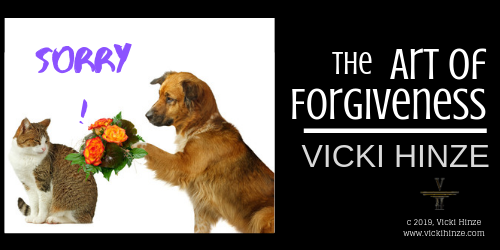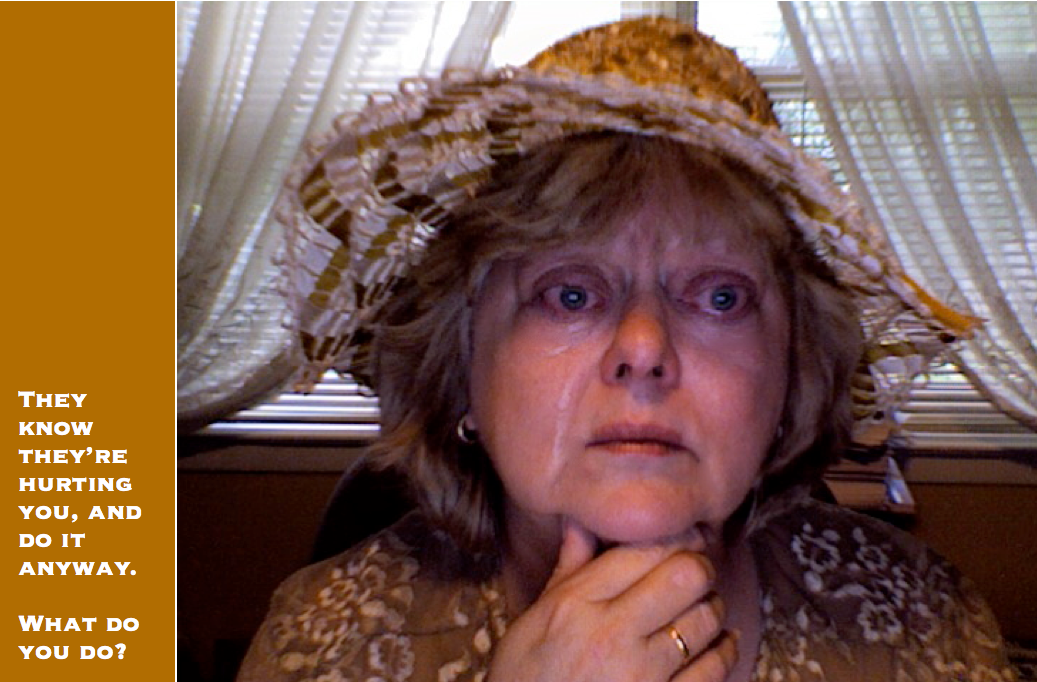THE ART OF FORGIVENESS by Vicki Hinze
We’ve all been wronged, and we’ve all wronged. One would think that would make the art of forgiveness easier, and yet it is something most still resist. We tend to remember every infraction against us, but to forget every infraction we’ve committed against others.
Oh, it’s easy to forgive when someone genuinely expresses regret or sorrow at hurting us. It’s much, much harder to forgive when that person denies having done anything which requires forgiveness.
Let’s say, for example, someone accuses you of something you didn’t do. If given the opportunity to deny doing that thing, you might resolve the difference. But what if you aren’t given the opportunity? What if that person severs any relationship with you, and you’re forever tainted as one who did something against them when perhaps you were trying to protect them? There’s no opportunity to forgive or be forgiven…or is there?
There is. Forgive them anyway. They won’t know it, but you will.
Let’s look at gossip. It’s rife in our world, and it often wounds in ways we can guess and in ways we can’t begin to understand. What if gossip is repeated and it proves untrue? Who does it harm? Everyone who listened and repeated the gossip. And everyone else who heard it third and fourth-hand and repeated it—or believed it.
You see, the harm in gossip isn’t just to the subject of the gossip, but to the gossiper, and to those who listen to it. Don’t fool yourself into thinking that if you just listen, it’s not causing harm. It is.
The thing about forgiveness is that we’re all going to do something that hurts another. Perhaps not intentionally, but even unintentionally, it hurts. And odds are high that at some time we’ll be on both ends of that kind of hurt.
We’ll be sitting in a restaurant and overhear a conversation about us being deceived by someone being dishonest with us. We’ll be told about some unidentified person doing something foolish or dishonest—and recognize that person is us. We might know it isn’t true, or we’re being maligned unjustly, but we still feel shamed, embarrassed, or worse.
The point is, at some time we’re going to need to extend grace and to receive grace. If we refuse to extend grace when someone maligns us, what happens when we step over the line and need grace?
When there’s a disagreement, often we have the chance to apologize and set things right. That’s a blessing and once it’s done, it’s over. We don’t apologize to keep the peace. We don’t apologize to end a disagreement for the sake of ending the disagreement. On those things, we agree to disagree. We disagree with respect.
When there’s a disagreement and we do not have the opportunity to explain things were taken wrong, or out of context, then the art of forgiveness isn’t lost. It’s just different.
You don’t have to address an infraction with another to forgive them. You forgive them on your own.
The bigger the harm to you, the harder this is to do, and there’s no way around that. But that you forgive them anyway speaks to your character, not theirs. It speaks to you attempting to do what is right even when only you and God know you’re making the attempt.
Sometimes forgiveness is easy. The fonder you are of the person before the infraction, the easier it is. You have all their endearing traits to draw on to soften the upset of being maligned. If you love that person, it’s a hundred times easier to forgive anything. It comes in the love package, because we’re all human, and we all make mistakes.
If there is tension in the relationship before the infraction, it becomes a bit harder. And the more emotions the infraction engages, and the more people involved, the more difficult forgiveness becomes. But it is so important to forgive anyway. Regardless of where things end up on the surface, inside you forgive. Only by forgiveness do you reclaim your peace.
You see, inner peace is at the root of forgiveness. Without it, you don’t have peace. But if you can forgive the unforgivable, you can reclaim that inner peace.
That doesn’t mean you permit someone to hurt you. It doesn’t mean you forgive and forget. That’s absurd. You forgive and move on. Some are best forgiven and kept distant—by your choice or theirs or both. Some are best forgiven and reunited. You know the difference by the nature of your relationship and the infractions.
The art of forgiveness isn’t to do it. That’s a given. For the other person and for you. Anger, upset, pain is a heavy burden to carry. When you forgive, you let go of it.
You do not let go of the wisdom and insight you gained in the experience. It hones discernment. And that is where the real art of forgiveness is expressed.
An example. A former president said, “Trust but verify.” That’s discernment. Watch actions as well as hear words.
We’re taught to “pray for our enemies.” We’re also taught to forgive over and again, by those who ask. That extends to those who hurt us, whether or not they’re beloved. So, what if someone with whom you had differences has passed on. You are not prevented from resolving this within.
If direct means for resolutions are not available to you, if the person is alive or dead, you aren’t prohibited from forgiving. Forgive them in prayer. This enables you to regain your inner peace. And remember, use discernment. You can forgive, but not put yourself in a vulnerable situation with that person again. Still, you forgive.
There are as many types of forgiveness as there are situations that require forgiveness. If you always begin with the premise that forgiveness is essential—to both parties—you’re halfway there. Be determined and steadfast in resolving the conflict. If you do not resolve it, it’ll become an old tape in your mind that replays over and over, even when it shouldn’t.
Remember these things:
We all need forgiveness. If we give it, we’re more apt to get it.
Forgiveness is the means through which we can let go of old problems and reclaim inner peace.
Forgiving doesn’t mean permitting disrespect or abuse.
Forgiving is an art aided by discernment on what is right in a given situation.
Determining what you should do to forgive and reclaim your inner peace—what is the right thing in this specific situation—that is the home of discernment in forgiveness.
And for the best example of it, we need only to look at the most amazing act of forgiveness ever expressed in all of human history: to Christ on the Cross.
There wasn’t an infraction that wasn’t committed against Him, and yet he forgave, and He prayed for forgiveness for those who harmed Him.
Discerning, and the Master of the art of forgiveness…






